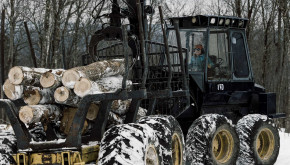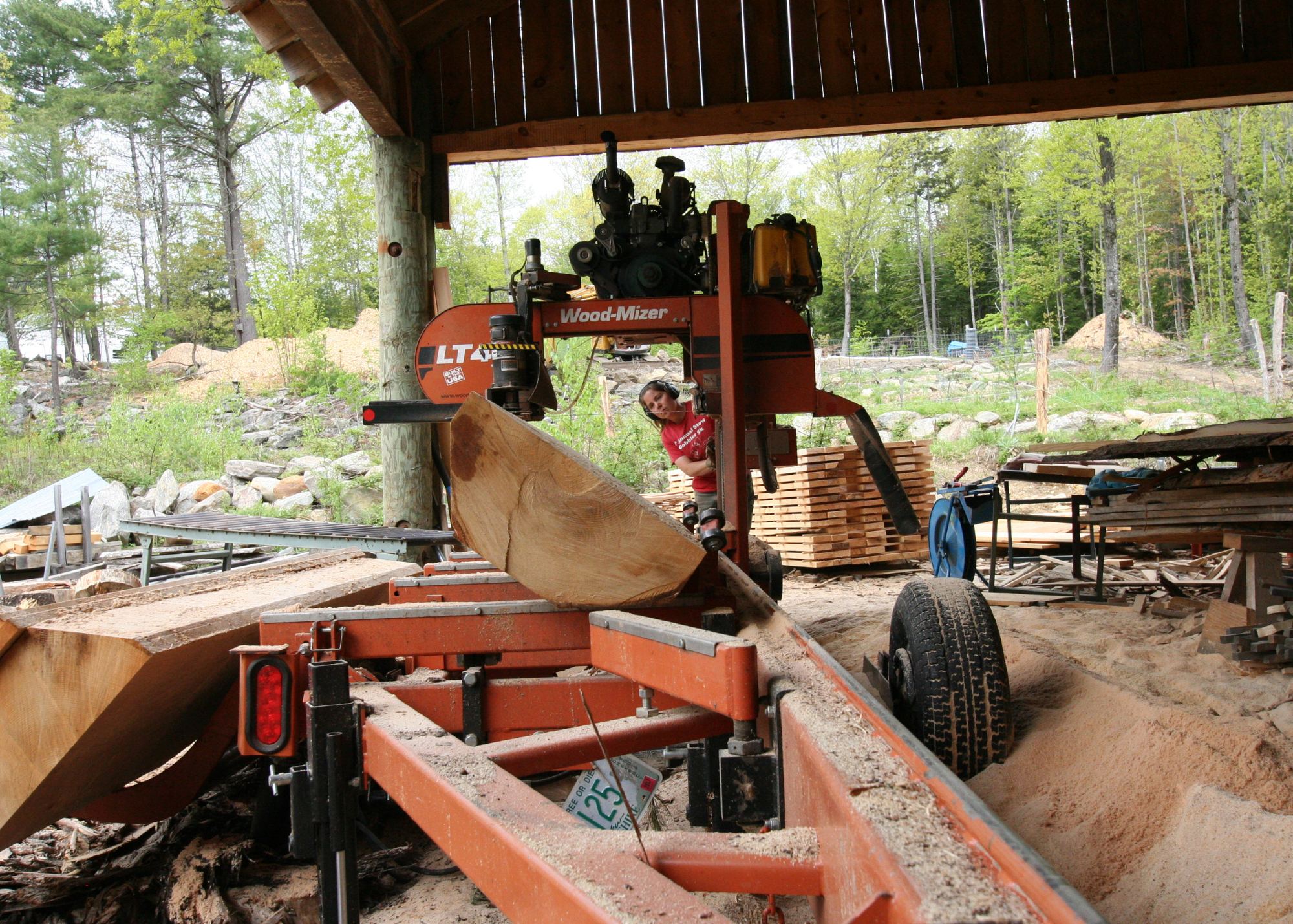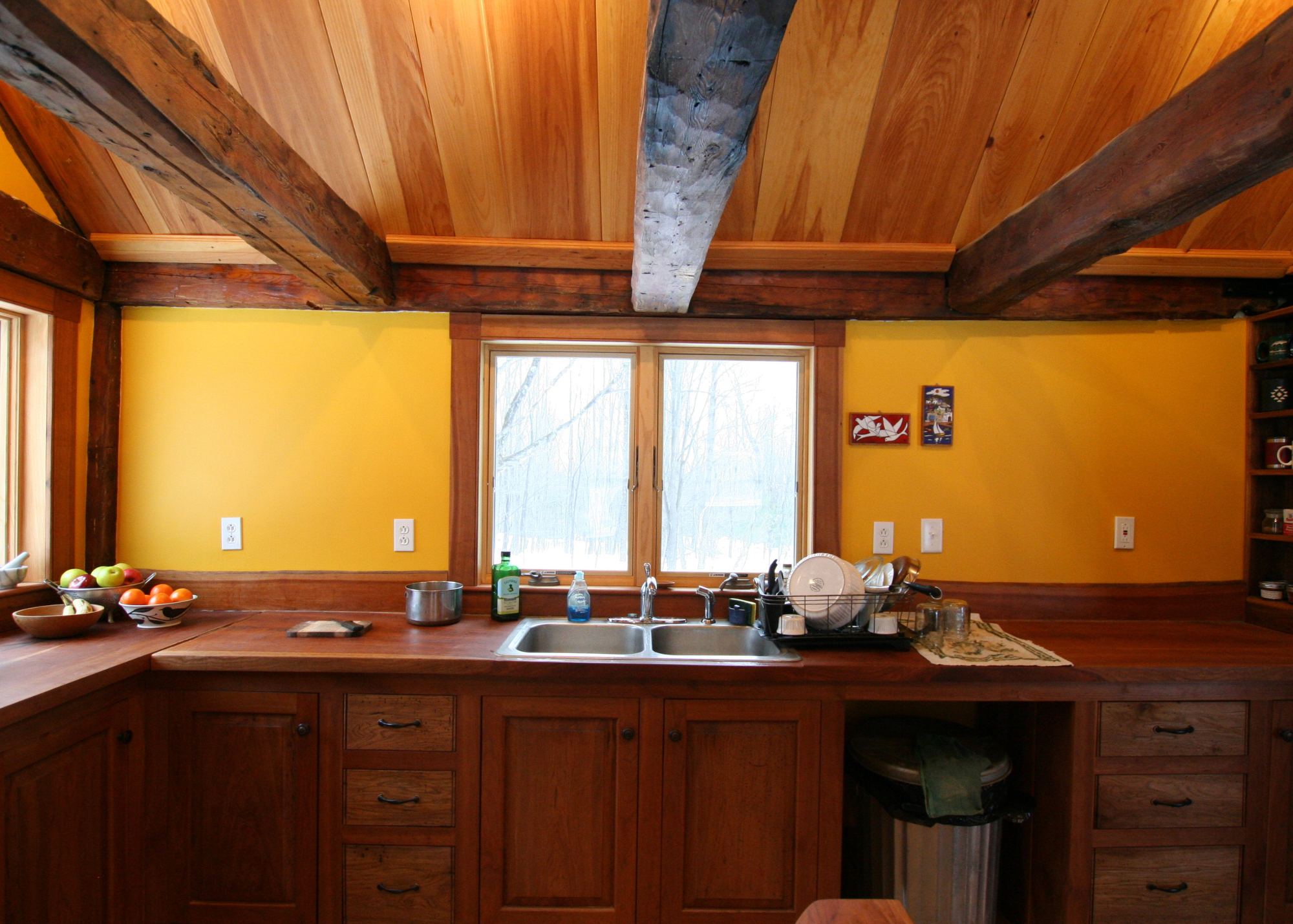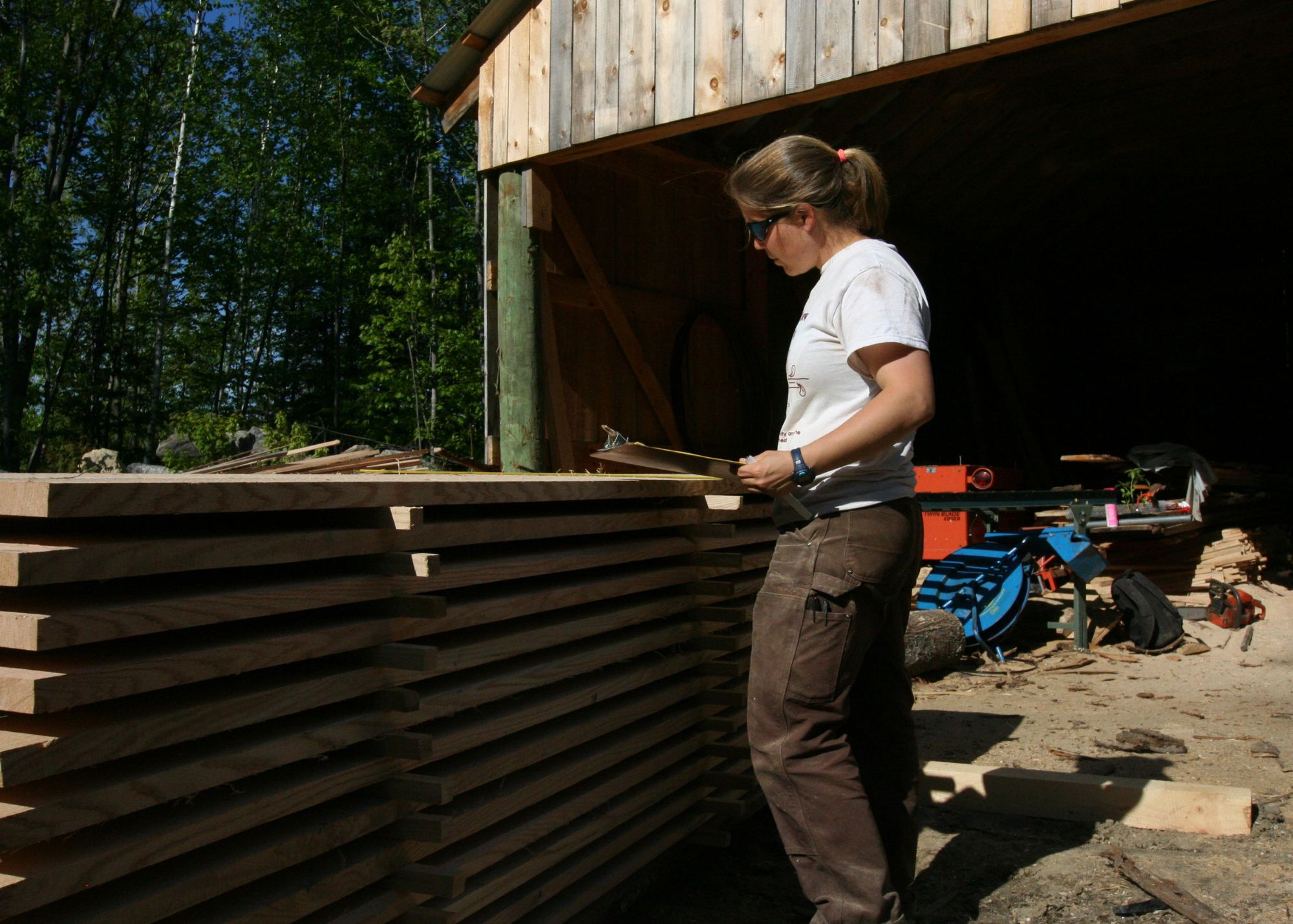
Written by Maddie Eberly, based on an interview with Katrina Amaral. Photos shared by Katrina Amaral, above photo taken by Joe Klementovich.
 Katrina Amaral and her husband, Miles, established Timberdoodle Farm 12 years ago in the driveway of their rental apartment near the University of New Hampshire (UNH). They had a portable sawmill and a few chickens in a homemade coop. Soon, they set up the sawmill more permanently in Stafford, New Hampshire, and it quickly became a full-time job. Together, they invested in equipment to make the operation more efficient. In time, they became fully vertically integrated, meaning Katrina and her husband do everything from harvesting trees to milling, drying, and processing the final lumber product for their clients.
Katrina Amaral and her husband, Miles, established Timberdoodle Farm 12 years ago in the driveway of their rental apartment near the University of New Hampshire (UNH). They had a portable sawmill and a few chickens in a homemade coop. Soon, they set up the sawmill more permanently in Stafford, New Hampshire, and it quickly became a full-time job. Together, they invested in equipment to make the operation more efficient. In time, they became fully vertically integrated, meaning Katrina and her husband do everything from harvesting trees to milling, drying, and processing the final lumber product for their clients.
The operations at Timberdoodle are small scale – it’s like your local micro-brewery. Historically, the northeast had lots of small mills and houses built from timber off the land, but the sawmill industry has consolidated over the last few decades and most wood is processed at just a few locations. Katrina and her husband are working to recreate local networks for sourcing lumber and keep harvested trees in the local economy.
 “We move wood in circles,” she says. Trees travel from a landowner’s woodlot to Timberdoodle to be processed and then back to the landowner for use in building projects. This allows landowners to fully utilize the diversity of local trees to renovate their kitchen, build new structures, or hundreds of other possibilities, while reducing carbon emissions by minimizing trucking, storing carbon in structures and furniture, and stewarding the land with ecological needs in mind. During her time at UNH and while working field seasons in the marshes of New England, Katrina amassed knowledge of conservation biology which she now uses to build connections between people and the forest, through the lumber it produces. Her clients see first-hand the benefits of using wood from their own land to both them and their forest.
“We move wood in circles,” she says. Trees travel from a landowner’s woodlot to Timberdoodle to be processed and then back to the landowner for use in building projects. This allows landowners to fully utilize the diversity of local trees to renovate their kitchen, build new structures, or hundreds of other possibilities, while reducing carbon emissions by minimizing trucking, storing carbon in structures and furniture, and stewarding the land with ecological needs in mind. During her time at UNH and while working field seasons in the marshes of New England, Katrina amassed knowledge of conservation biology which she now uses to build connections between people and the forest, through the lumber it produces. Her clients see first-hand the benefits of using wood from their own land to both them and their forest.
Katrina has been guided through her career by the people she has connected with along the way, building understanding of her own needs as a leader with ADHD, navigating sexism and intelligence biases, and overcoming imposter syndrome.
Earlier this year, Katrina left her position as Executive Director at Bear-Paw Regional Greenways to play a larger role at Timberdoodle Farm. “There were a lot of guesses about why I was leaving - including assumptions about pregnancy - but the reality is that women can change careers at any time for any reason and for me the reason is that I am not a desk job person”. A critical component of her success has been paying attention to how she functions best. Coming to understand how her brain works has helped guide her career decisions to work that allows her to excel and feel satisfied.
 During her career, from student to sawmill owner, Katrina has had to navigate sexism. As a student, she noticed others perceived her male classmates as experts in the field while she was not. Katrina and many women (as well as other folks!) experience imposter syndrome, a feeling of inadequacy at a task or job despite holding the right qualifications. When examining themselves in their careers, women may feel that they must be good at every single component, and if not, they're not qualified for the job. Katrina says, “WRONG!!” Women can do anything - including fail at things! - but it’s hard not to doubt oneself sometimes. Katrina notes, “You are often your own worst critic. Find a support human or network. If you’re good at it, if you love it – go for it!”
During her career, from student to sawmill owner, Katrina has had to navigate sexism. As a student, she noticed others perceived her male classmates as experts in the field while she was not. Katrina and many women (as well as other folks!) experience imposter syndrome, a feeling of inadequacy at a task or job despite holding the right qualifications. When examining themselves in their careers, women may feel that they must be good at every single component, and if not, they're not qualified for the job. Katrina says, “WRONG!!” Women can do anything - including fail at things! - but it’s hard not to doubt oneself sometimes. Katrina notes, “You are often your own worst critic. Find a support human or network. If you’re good at it, if you love it – go for it!”
For all landowners, knowing what resources are out there can be a challenge. Katrina has seen that it is even harder for landowners to make decisions if they feel like they don’t have the language to talk to the other folks in the timber supply chain. Katrina works with all sorts of landowners and has seen the cultural reevaluation of women in leadership roles. Many women landowners come from a generation skeptical that women could manage land well, where husbands and cis-male-relatives made all the decisions. She says to women landowners, “you are capable of making decisions.” Even if you don’t know how to identify all the tree species or know all the lumber jargon, you can learn, ask questions, and observe what’s happening in the forest. She encourages women landowners to advocate for what they feel is right for the land and to strive to be known for what they leave in the forest rather than for what they take.
 Katrina has great collaborators who are men, but she says that does not replace the value of a woman-based network. Last summer, she attended the New England Women Foresters Collaborative’s summer gathering. Katrina came out of the gathering feeling hopeful and inspired.
Katrina has great collaborators who are men, but she says that does not replace the value of a woman-based network. Last summer, she attended the New England Women Foresters Collaborative’s summer gathering. Katrina came out of the gathering feeling hopeful and inspired.
Now that she is well established in the field, Katrina has to navigate biases not related to her gender but rather her intelligence. Many people don’t realize that it takes a lot of skill to run a sawmill business and operate equipment sustainably and well. “There are a lot of incredibly smart people who work in the woods.”
Despite the challenges, working in natural resources has been a great experience for Katrina. She doesn’t have a single favorite memory from her years in the field but rather a conglomeration of serendipitous occurrences. Many of Katrina’s best memories happened a half hour past when she wanted to be done for the day, seeing little baby piping plover chicks running across the sand, a peregrine falcon zooming overhead, or a dramatic sunset during the last log skid. She finds satisfaction in learning new things, like when she learned how to use the tree shear this past winter. It’s all the little things that stand out in her memories.
 Katrina is proud of building up Timberdoodle Farm. With her business and life partner, Miles, they built a business they feel confident in sustaining. Timberdoodle matches their values and needs. Katrina is proud of the tangible skills she has learned while getting Timberdoodle off the ground. In learning about her equipment, she can now hop into any piece of machinery and use it well. Her kitchen reflects her personal growth and values; it holds a gorgeous patchwork of tree species harvested locally and milled in her backyard. Conservation work does not have to be out of reach for landowners. Katrina has proven that and so much more.
Katrina is proud of building up Timberdoodle Farm. With her business and life partner, Miles, they built a business they feel confident in sustaining. Timberdoodle matches their values and needs. Katrina is proud of the tangible skills she has learned while getting Timberdoodle off the ground. In learning about her equipment, she can now hop into any piece of machinery and use it well. Her kitchen reflects her personal growth and values; it holds a gorgeous patchwork of tree species harvested locally and milled in her backyard. Conservation work does not have to be out of reach for landowners. Katrina has proven that and so much more.
Check out Timberdoodle’s Instagram account and Katrina’s article on Portable Sawmilling, written for WOW and picked up by NPR Marketplace.

